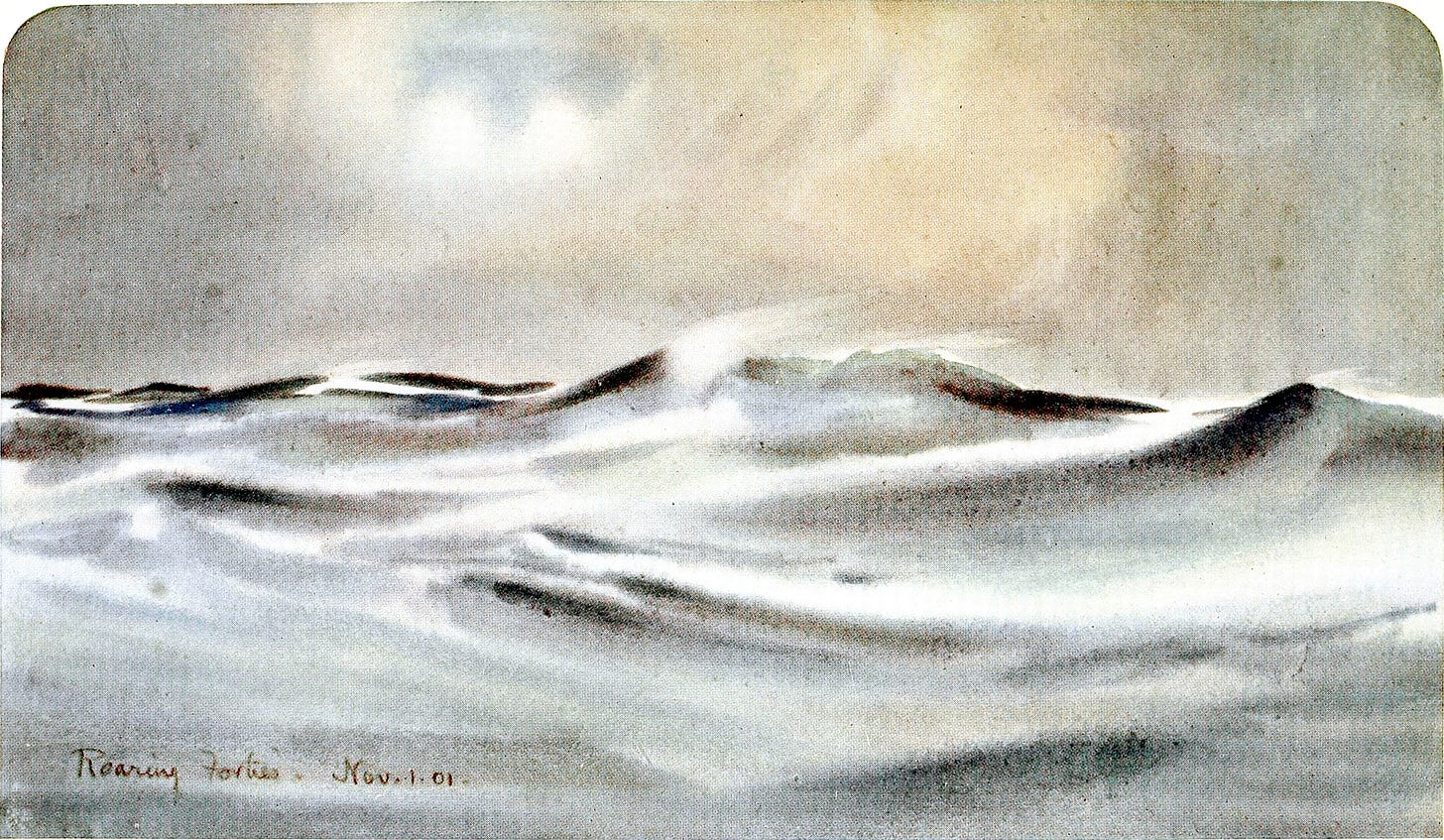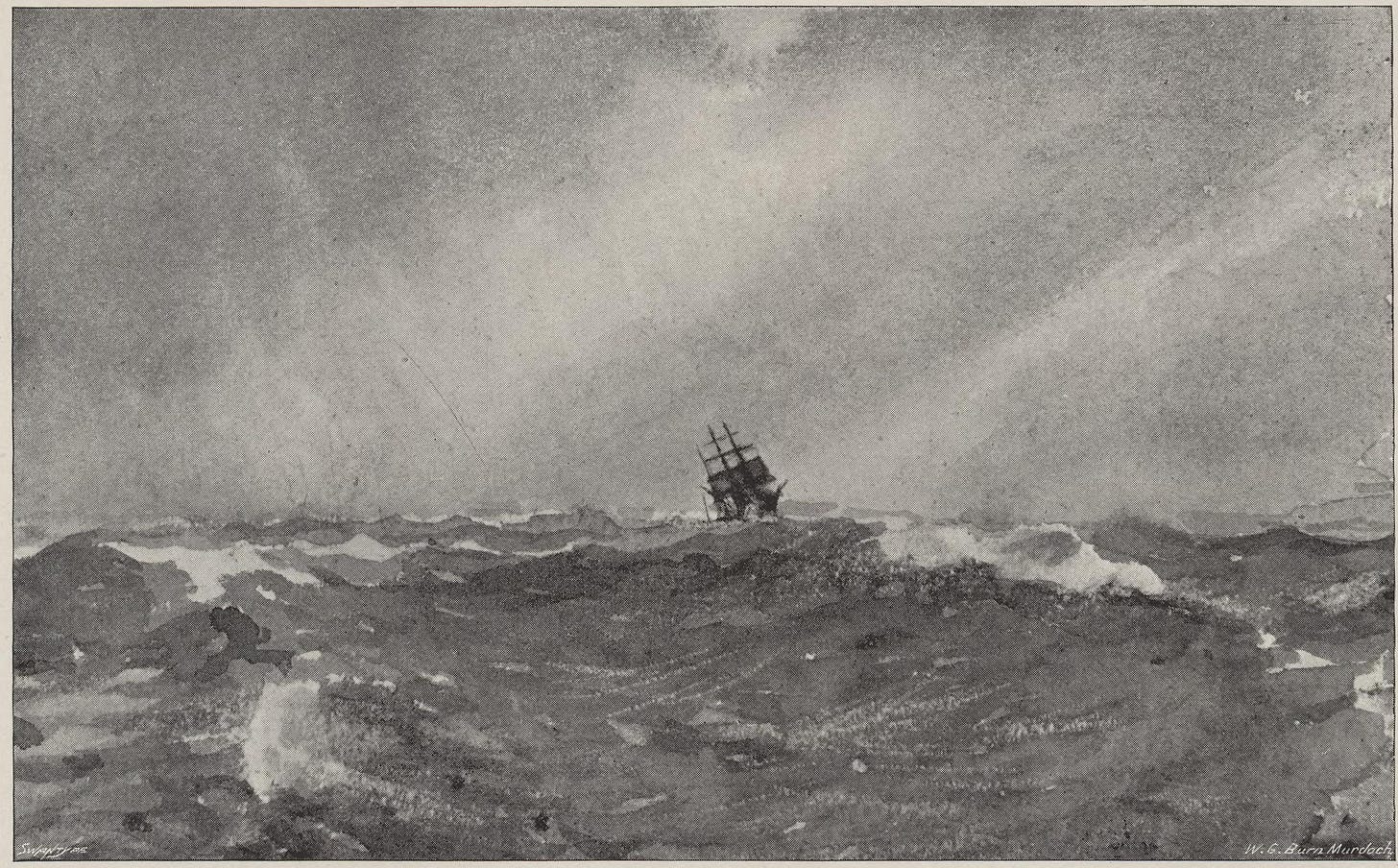Storm and Tempest
Etymologies of wrecks and salvage

Dear reader,
This is the second post in the Etymologies of Wrecks and Salvage mini-series. You can read the first and introductory post here.
Otherwise, enjoy.
I was born on an island off the coast of Australia; it lies in the path of the Roaring Forties, strong winds found between latitudes of 40 and 50 degrees south. King Island was a beautiful place for a child to ramble around but it had a grim history of shipwreck - over 60 tall ships foundered on its coasts due to those strong winds and often inclement weather.
Perhaps growing up in a place steeped in the history of shipwreck gave me a predilection for words to do with that? I remember lying in bed as a child, terrified, while violent storms raged outside.
When coming to write these posts I was curious about the etymologies of the synonyms ‘storm’ and ‘tempest’. ‘Tempest’ arrived in English in the 13th century, later than the Old English ‘storm’ and both words were used by English speakers to mean what they pretty much mean today - violent weather and, analogously, some kind of commotion.
The main difference between the two words lies in their ancient roots. According to the excellent etymonline website, the earliest ancestor of ‘storm’ came from a Proto Indo European word meaning “to turn, whirl.” ‘Tempest’, on the other hand, came from a Latin word meaning "a storm, commotion; weather, season; occasion, time." The “Latin sense evolution is from "period of time" to "period of weather," to "bad weather" to "storm."” So, one word has its roots in a meaning connected to movement, and the other is connected to time.
Torturing the analogy
When caught up in a crisis, analogies to do with storms often come to mind. Recently, I have been dealing with a series of problems that compounded each other and have been thinking of that as ‘a perfect storm’. And, as another example, volatile people or dynamics are often described as ‘tempestuous’, as sharing qualities with tempests.
In reflecting on the etymology of ‘storm’ as a sense-making prompt, I have found myself pondering on what it was about recent events that gave me the sensation of being turned or whirled about? Was it the speed with which elements of my life were overturned? Or the abrupt or unexpected onset of certain commotions? Or that the storm damage left behind was worse than expected?
And that link between ‘tempest’ and time yielded a useful line of thought as well. I realised how distorted my sense of time had become. For the last year or so I have had the strangest sensation of being frozen in time - stranded without momentum and its potential for change - while feeling urgent and pressed for time. Time has stretched out before me like a desert, and yet there doesn’t seem to be enough of it to cope with life’s exigencies. I had not realised just how peculiar my sense of time had become until I started mentally toying with this etymology.
And that’s why I value thought exercises like these. They allow me to slowly reclaim my mind from the mush it becomes under sustained pressure. Have the words ‘storm’ or ‘tempest’ or any other weather related vocabulary or imagery inspired anything for you? Let me know in the comments below.
Thank you for reading!
If you would like to support my curating and writing, you can make a small donation here.
And further thanks…
… to those of you who made a small donation on my birthday earlier this week. That was so appreciated.
And a warm hello…
… to those of you who recently followed and subscribed to this Substack. There was actually a little surge of subscriptions on my birthday; those of you who subscribed this week probably had no idea that you were giving me a nice gift. Thank you and I hope that you enjoy these posts.



You could find interesting the fact that the most common trasnlation for storm into spanish is "tormenta" ,same ethimological root that the english torment , derived from the latin tormentum with origins in the verb "torquere" - to twist -
https://commons.wikimedia.org/wiki/Category:Statue_de_Notre-Dame_des_Naufrag%C3%A9s
Our lady of the shipwrek - Finisterre
Wow, thank you for sharing. I've never heard of the Roaring Forties but now I am fascinated! There's something about those dangerous-yet-beautiful places that one might grow up in.
Thanks also for sharing the etymological roots of "tempest" and "storm." Your line of thought suddenly brought up the word "temptation" for me, and I was struck by this visceral image of how the emotional experience of temptation can certainly feel like a whirling, stormy sensation. Like, you might feel tossed back and forth between what you *should* do versus what you *want* to do.
All that to say, you got me down a rabbit hole of seeing if there was a link between the etymology of "tempest" and "temptation," which apparently there is: https://www.reddit.com/r/etymology/comments/2exaaw/what_is_the_relationship_between_the_latin/
Google's AI summary (take with a grain of salt) says: ""Temptation" and "tempest" share a linguistic connection through their ultimate origins in the Proto-Indo-European root *temp-, which meant "to stretch". "
Always enjoy your writings! Thank you again for sharing.